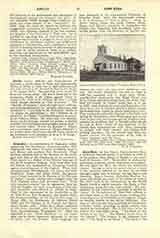

Aben-Ezra (or IBN ‘EZRA), ABRAHAM-BEN-MEIR, a celebrated Spanish Rabbi, b. at Toledo in 1092; d. on his journey from Rome, or Rodez, to his native land, January 23, 1167. He excelled in philosophy, astronomy, medicine, poetry, linguistics, and exegesis. He was called the Wise, the Great, the Admirable Doctor. Having to leave his native city on account of the vexations inflicted on the Jews, he travelled through a great part of Europe, through Egypt and Palestine. Rome, London, Narbonne, Mantua, Verona, and Rodez are some of the places he visited. His chief work is his commentary on the Sacred Books, which is nearly complete, the Books of Paralipomenon being the only ones missing. His commentary on the Pentateuch appeared in several revisions. In his commentary Aben-Ezra adheres to the literal sense of the Sacred Books, avoiding Rabbinic allegories and Cabbalistic extravagances, though he remains faithful to the Jewish traditions. This does not prevent him from exercising an independent criticism, which, according to some writers, even borders on rationalism. But in his other works he follows the Cabbalistic views. “The Book of the Secrets of the Law“, “The Mystery of the Form of the Letters”, “The Enigma of the Quiescent Letters”, “The Book of the Name”, “The Book of the Balance of the Sacred Language”, “The Book of Purity [of the Language]” are perhaps the most important of his works of this kind. They were written during his life of travel, and they reflect the unsteadiness of his outward circumstances. Taking Aben-Ezra’s work as a whole, it consists rather in popularizing Rabbinic Andalusian ideas on Latin and Saxon soil than in producing original thought.
A.J. MAAS

